- Home
- John Ellsworth
Hellfire (Sisters In Law Book 2) Page 2
Hellfire (Sisters In Law Book 2) Read online
Page 2
Next came Christine straight from court where she had spent the morning arguing against a motion for summary judgment filed by the City of Chicago's attorneys in a case involving a highway lane-drop and a claim of negligent signage in a construction zone. Her client had been made a quadriplegic when a seven-foot drainage pipe abruptly halted his fifty-mile-per-hour Taurus.
"How are tricks, Chris?" Althea asked with another swallow of her drink.
"Starting early, Althea?" said Christine, referring to the alcoholic drink.
"Never quit so there's no early," Althea quipped.
"I hear that. Tricks are good. I'm suing all the right people and defending all the wrongly accused."
"And the kids?"
"Jamie is thriving. He's in advanced everything, his junior year. Janny is growing too fast and giving her third piano recital Saturday afternoon. Life is good."
"Men?"
"No. Still missing Sonny," said Christine, referring to her deceased husband who had been murdered by a hit man who was actually after Christine.
"That's too bad. But I understand, definitely."
At that point Winona Lindsey joined the two women. She wore a translucent skim of makeup like some Vogue goddess. She was beyond attractive even in middle age and turned heads as she passed through the restaurant.
"Hey, Toots," said Christine to Winona. "Glad you could make it."
Winona did a fake shudder. "Terrible case. Made me ill to hear about it."
"Like what?" asked Christine?
"Well, we got an email from some woman in Syria. An American missile wiped out her entire family. Girls, boys, brothers, parents, aunts and uncles--all buried under twenty feet of rubble."
"Sounds grisly," said Althea. "My guess is the DuMont brothers had something to do with it."
"Why would you say that?" asked Winona.
"I would say that because nothing horrible happens in the Middle East without the DuMonts’ fingerprints all over."
"Why did she email us?" asked Christine.
Winona nodded. "She found our website. She liked what she read about you."
"And she's looking to us for what?"
"Something about suing the government."
"For what?" asked Althea. "Murder?"
"It was a drone strike. The only government I know of still killing off people with drones is the U.S. Stands to reason it was us."
Althea shuddered and took another sip of her drink. "DuMonts. Screw them."
The waiter materialized and took drink orders from Christine and Winona, who ordered coffee and iced tea, respectively.
"Seriously," said Christine to Althea, "what makes you connect the DuMonts to this particular drone strike?"
Althea shrugged. "Their next stop is Syria. There're ten trillion barrels of sweet crude under Syrian sand. How could they not be involved in removing obstacles in the way of DuMont oil tankers?"
"Gives me pause," said Christine. "We'll need to follow up on that," Christine said to Winona. "Let's see where it goes."
"Hey, you're talking to the wrong lady there," said Althea. "How about hiring me to investigate? It's only one more rock on a huge pile I already have stacked up against the DuMonts. With me having ninety-nine percent of the research already done on my laptop, I can get back to you on it inside of thirty days."
"Interesting," said Christine. "How are your resources?"
"Intact. I've got people everywhere in the Middle East."
"CIA?"
"Some. Some Mossad. Some Iraqi. Some even Syrian army. You need it, I've got it. Why, are you thinking about suing for this lady?"
"I'm thinking we should give it a hard look," said Christine. "I'm thinking I definitely want to follow up with her. What's her name, Win?"
"Sevi. Her name is Sevi al-Assad and the wedding party was in Deir ez-Zor. Which is eastern Syria, to you."
Christine nodded and spoke thoughtfully. "Sevi. Sevi al-Assad versus Blackguard, Inc., Defendant, and United States of America, Defendant. Has a good ring to it."
"It does," agreed Winona. "I told her we were interested."
"You did? Without talking to me?"
"You said when I came over from the PD that I would work independently. Well, this is an exercise of my independence."
"Got me there," said Christine. "I wasn't challenging you. Or maybe I was. Sorry about that."
"Forget it. This case has legs. A huge upside."
"How many people died in the drone strike?"
"Get ready. She said forty-two lost their lives."
"OMG," said Althea. "I'm definitely in."
"Yes, so am I," said Christine. "When can I talk to her?"
"I told her you could come to Turkey next week. That too soon?"
"Depends on my calendar."
"Covered. I moved some staff around so you could take the Gulfstream to Turkey."
"We're serious today, aren't we?"
Winona smiled and accepted her iced tea from the waiter. "That's what you hired me for. Just doing my job, Boss."
"And rocking my world," said Christine.
"So what about me?" asked Althea. "Am I onboard?"
"You are," said Christine. "I want a smoking gun linking the DuMonts to the drone attack. Plain and simple."
"I can do that," said Althea. "It'll be the best money you spend this year."
"What, you're charging me for this?"
Althea smiled. "You're lucky to get me. I'm worth every penny."
"You are, Girl," said Christine. "Definitely that."
3
Five months passed.
Microsurgery repaired the fractured spine. The knee was reconstructed. Four surgeries later and Sevi began physical therapy. It was at first thought she wouldn't walk again, but in her determination she managed to develop a limping gait. Hearing loss was 100% and 50%. She was fitted with a hearing device and managed to again converse.
All her family was gone. Her father and mother, brothers, aunts, uncles, and in-laws-to-be were lost in the destruction leveled at them by the Americans. The fiancée she planned to build her life with would never become the husband she had dreamed of so often. She missed her people and cried dozens of times a day. She saw no reason to recover and live on, but her therapists demanded she start her life all over.
She returned to her home in a small village outside Deir ez-Zor and eventually found a job as an Internet-based computer programmer. Her undergraduate degree was in computer science and she had most of a master's done in software engineering through an online school in California.
While her body had been restored, her emotional state was anger from one end to the other. She hated Americans, hated America and hated everything Western. She came to understand that her oldest brother had been the target that wedding day and that the rest of those present were merely collateral damage in the Americans' quest for "high-value" targets. With every day that passed, she loathed the West for its dispassionate genocide. She yearned to hit back, to destroy something--anything--and so displace her pain outside herself.
At night she studied maps and articles about America. She wondered how one might smuggle a bomb there--anywhere inside the country would do--and avenge her family's death. She imagined herself as a suicide bomber for ISIS and carrying forward her brother's work.
One night, as she scanned the Internet and sought her revenge, she came upon a website. It was the website of an American lawyer, a woman who claimed she practiced public policy law.
In a flash, Sevi recognized what needed to be done. She sent an email to the woman's website. In it she asked, "Would you sue the U.S. government for the death of my family?"
The woman's staff immediately wrote back and the conversation began. They wanted to talk. They wondered if Sevi could get to Ankara, Turkey. Sevi had never in her life considered traveling to Turkey. But she began to study the route and began to realize how that might be done. For if she made it there, the American lawyer would come to Turkey and they would ta
lk.
Sevi wrote back and said she would find a way to meet the lawyer in Turkey.
Then she studied the woman's Internet page.
Her name was Christine Susmann.
"Well, Christine," said Sevi to the night sky, "while you are busy making the lawsuit, I will be busy making the bomb. Just get me to America."
With no other surviving heirs, her father's business ventures defaulted to Sevi. This included the plant that manufactured tires.
Having inherited from her father the adaptive business gene as well, she put the tire enterprise up for sale. After outstanding balances and tax owed to the governorate, she netted 2,833,931 SYP--about $15,000 USD. She gave away her TV, refrigerator and computer to the family living in the flat directly below her.
Relieved of all worldly goods, she purchased a seat on a train that took her to the Syrian border with Turkey. At the border, she then walked to the bus station with her backpack and traveled into Turkey.
It was a long, crowded, dusty ride that provided only intermittent times of relief from the overcrowding whenever the driver managed to kick the AC unit with the proper force, causing it to roar to life and circulate air back down the aisle to where Sevi sat reclined, a damp handkerchief over her face, as she tried to find a moment alone.
Then she was in Ankara, where she checked into a hotel.
Now to notify the American lawyer she was waiting.
Then it would begin.
4
Christine located her window seat on the Turkish Airlines' Boeing B777-3. It was a wide-bodied plane with ample legroom and a seat three inches wider than business class.
She buckled in and stared out the Plexiglas. Her reflection stared back: thick black hair parted severely down the middle and jaw-length on the sides, chocolate eyes gleaming with anticipation, eyes that interpreted her world carefully and courageously, a thin but attractively flat nose with a white scar across the bridge from a training accident suffered in the Army's SERE school in Fort Bragg, and a firm mouth capable of holding its own in any dispute. She liked her face and, knowing she was totally alone, she winked at her reflection. It was childish and a bit coquettish, but it balanced out all the serious in her life.
Stowed in the overhead was her backpack. It was her only piece of luggage. The topmost pocket contained her iPhone and mini-iPad, both of which had been carefully scrubbed of all IP addresses that would indicate she was American, then loaded with browser bookmarks and histories that proved she was a Pakistani. An unopened juice bottle of Pakistani origin lay secured in the water loop on the other side of the pack. Inside the large zipper on the front of the bag were Pakistani cigarettes and blue jeans and colored T-shirts, as well as American Teva sandals with an Amazon purchase receipt stored on the iPad's memory chip, which showed a conversion of currency from Pakistani rupees to American dollars. And down below, in the lower pocket, she had carefully stowed her passport and driver's license, also Pakistani, both several years old, both carefully forged at a cost of $12,500. Everything she carried and all traces and electronic bytes proved--and, more importantly, didn't disprove--her claim of Pakistani citizenship.
* * *
She flew Turkish Airlines from Chicago to Istanbul with a four-hour layover in Berlin. A change of planes allowed onboard a dark man. When first stepping inside the aircraft, his quarry was immediately picked out from the three hundred faces aboard the 777 in a quick glance down the aisle. He had received a half-dozen photographs to memorize and he had been a careful student. He took his seat directly behind hers. He carefully avoided looking at her.
They landed at 7:15 p.m. Istanbul time, jarring her awake from a light, restless sleep. She stood in her row and waited for it to clear, then reached up and found her backpack in the overhead. She swung the backpack out and down and worked the straps up over her shoulders. She hadn't changed out of her sweatshirt, though she thought the outside temperature would be stifling and that she would need to shed the sweatshirt before leaving the terminal.
The dark, seemingly oblivious man behind her, timed his own standing and gathering of his backpack so that he would be able to slip in behind her and follow her from the plane. He was shiny and dark, a Baghdad native and a Muslim. A hex-wrench shaped scar traveled from his right eyebrow straight back for an inch then down his cheek for three inches. The suture line was pink against his skin and fresh and angry. Tortoise shell eyeglasses were perched atop his head. He fingered them absently once the backpack was in place. He was dressed in black khaki pants and a black Polo shirt. He appeared almost careless as he tinkered with his pack and glasses. More than anything, he was patient.
As Christine fought to shrug into her backpack straps over the bulky sweatshirt, the dark man leaned back against his seat and allowed two travelers to pass by and join the line standing in the aisle. He pretended to be busy with his own pack but actually was not; he was simply waiting for Christine. When he had boarded her flight in Berlin, he brought with him her flight particulars courtesy of the hacked Turkish Airline reservation system. He knew her only as Ama Gloq. That was the name given to him. Not much of a challenge, he thought of her stature, as he sized her up. The rest of it promised to be simple, for an inveterate plant like him.
The Iraqi followed her up the Jetway and into the terminal. There she found a light-skinned woman wearing a headscarf and holding a simple hand-lettered sign that said, "Ama." Christine approached the woman and identified herself.
"I'm Ama Gloq."
"Say it."
"When it rains it pours."
"When it's raining it's pouring."
Christine nodded and accepted the straw-colored bag the woman held out to her.
Without another word they parted.
Christine headed for the restroom. She found an empty booth and opened the bag. Perfect: Glock 19 with IWB (In Waist Band) holster and extra clip for the belt.
She shrugged out of the backpack, pulled up the sweatshirt, worked it over her head, and stuffed it into the large pocket. She pulled at the waistband of her blue jeans and inserted the holstered gun inside on the right. The extra clip snapped over her two-inch-wide black belt. She pulled her white T-shirt hem down over the holster. The T-shirt was two sizes too big, and hid the print of the IWB carry. Quickly she finger-brushed her hair back on both sides and stood upright. Everything fit, the gun felt familiar, so she unlocked the stall and stepped out.
She managed one step before a forearm came smashing around the corner of the stall and caught her directly in the throat. She was thrown back, staggered, gasping for air, and raising her hands defensively as her tae kwon do reflex took over. A woman followed the forearm and stepped directly in front of Christine, pointing a small revolver in a two-handed grip. Christine appeared to faint and as she dropped, she swept her right leg against the woman's shin, dropping her to the tile floor. As the woman fell, Christine rolled into her, seizing the pistol and slamming it hard against the woman's nose. Blood spurted from the gaping wound and Ama knew the woman's own tears would momentarily blind her, giving Ama at best three seconds to end it. She raised up to her knees and struck again, this time with the butt of the pistol, fracturing the skull. Instantly the woman's eyes fluttered and closed and she limply sprawled across the tile. Christine stood and wiped the gun quickly. Then she dropped it on the floor, and stepped over her assailant, exiting the restroom while assuming the relaxed face of a passenger who just woke up and stepped off a long flight. She didn't notice the dark man standing across the passageway, outside the men's restroom, studying a street map and moving his lips as if reading.
Nor did she notice him toss aside the map and follow when she headed outside for the taxi stand.
A ten-year-old Volvo cab was next in line. The driver motioned her to climb in. She pulled open the back door. Tossing her backpack across the seat, she stepped in and was lowering herself to the seat when she felt a hand push her shoulder. The dark man looked into her eyes and she raised her legs as if to ki
ck at him, when he said, simply, "When it rains it pours."
She froze, then lowered her feet to the floor of the cab.
"You are?" she asked.
"I am Swarmi Reddiz. I am your bodyguard."
"You are early. You were to wait until I met the woman."
"I know. Move over, please."
Christine slid across the seat and the man sat down beside her.
"Winona Lindsey sent me."
"Show me your ID, please."
He smiled. "Ama, I'm not carrying ID any more than you are. The last thing we want here is ID."
"How do I know you're who you say you are?"
"Respond, please, so I can be sure you are who I think you are."
She sat back hard against the seat and stared out her window for several seconds. The man had the passkey--the word quintet that proved authorization. She turned back around.
"When it's raining it's pouring," she said.
"Thank you," said the man named Reddiz.
The cab driver raised his hands and shrugged and said in Arabic, "Where to?"
Christine answered in Arabic. "Pendik Station, please."
The cabbie nodded and smiled. It was a welcome fare, as Pendik Station was twenty-five kilometers east of Istanbul. He wheeled the old Volvo into the moving traffic lane and beamed in the rearview. "Please relax and enjoy."
"We'll talk at the station," said Reddiz to Christine, with a nod at the driver. "Ears."
Christine stared out the window to her left.
Istanbul was a modern city, the freeway was smooth and freshly topped, and the evening air not nearly as hot as she had expected. In fact, it was even pleasant. She cracked her window and inhaled. The air was pure and clean with a hint of plowed earth and new plants pushing through the soil of the fields that were opening up as they left the city behind. Ahead of them was an eighteen-wheeler with the omnipresent mud flaps of the nude woman in silver silhouette and for a brief instant she imagined she was back in Chicago, rolling eastbound on the Kennedy, headed for the office. She thought of Sonny, her husband of ten years, now deceased, and her two children, Jamie and Janny, probably huddled around the TV since Christine was away and their nanny was known to snooze.

 Girl, Under Oath (Michael Gresham Series)
Girl, Under Oath (Michael Gresham Series) The Fifth Justice (Michael Gresham Legal Thrillers Book 10)
The Fifth Justice (Michael Gresham Legal Thrillers Book 10)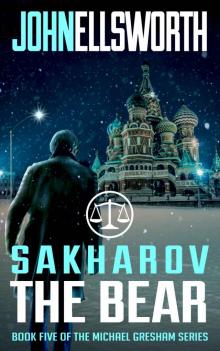 Michael Gresham (Book 5): Sakharov the Bear
Michael Gresham (Book 5): Sakharov the Bear Voices In The Walls: A Psychological Thriller (Michael Gresham Series)
Voices In The Walls: A Psychological Thriller (Michael Gresham Series)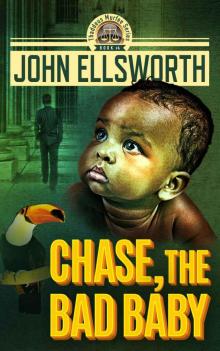 Chase, the Bad Baby: A Legal and Medical Thriller (Thaddeus Murfee Legal Thriller Series Book 4)
Chase, the Bad Baby: A Legal and Medical Thriller (Thaddeus Murfee Legal Thriller Series Book 4)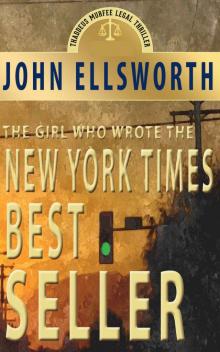 The Girl Who Wrote The New York Times Bestseller: A Novel (Thaddeus Murfee Legal Thrillers Book 8)
The Girl Who Wrote The New York Times Bestseller: A Novel (Thaddeus Murfee Legal Thrillers Book 8) The Defendants: Crime Fiction & Legal Thriller (Thaddeus Murfee Legal Thriller Series Book 1)
The Defendants: Crime Fiction & Legal Thriller (Thaddeus Murfee Legal Thriller Series Book 1) Hellfire (Sisters In Law Book 2)
Hellfire (Sisters In Law Book 2) A Young Lawyer's story
A Young Lawyer's story Annie's Verdict (Michael Gresham Legal Thrillers Book 6)
Annie's Verdict (Michael Gresham Legal Thrillers Book 6) Legal Thriller: Michael Gresham: Secrets Girls Keep: A Courtroom Drama (Michael Gresham Legal Thriller Series Book 2)
Legal Thriller: Michael Gresham: Secrets Girls Keep: A Courtroom Drama (Michael Gresham Legal Thriller Series Book 2)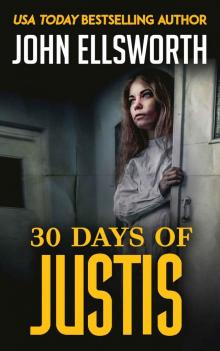 30 Days of Justis
30 Days of Justis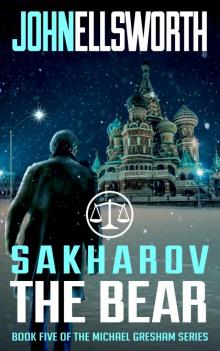 Sakharov the Bear (Michael Gresham Legal Thrillers Book 5)
Sakharov the Bear (Michael Gresham Legal Thrillers Book 5)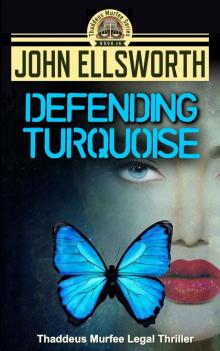 Defending Turquoise (Thaddeus Murfee Legal Thriller Series Book 5)
Defending Turquoise (Thaddeus Murfee Legal Thriller Series Book 5)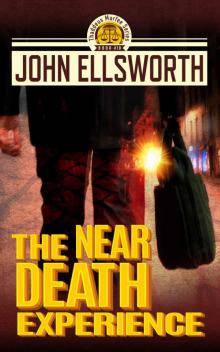 The Near Death Experience (Thaddeus Murfee Legal Thriller Series Book 10)
The Near Death Experience (Thaddeus Murfee Legal Thriller Series Book 10)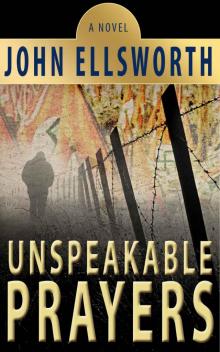 Unspeakable Prayers: WW II to Present Day (Thaddeus Murfee Series of Legal Thrillers)
Unspeakable Prayers: WW II to Present Day (Thaddeus Murfee Series of Legal Thrillers)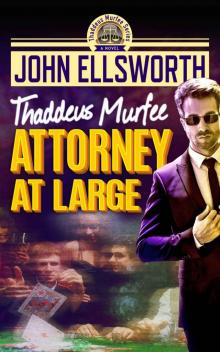 Attorney at Large (Thaddeus Murfee Legal Thriller Series Book 3)
Attorney at Large (Thaddeus Murfee Legal Thriller Series Book 3) The Law Partners (Michael Gresham Legal Thriller Series Book 3)
The Law Partners (Michael Gresham Legal Thriller Series Book 3) Annie's Verdict
Annie's Verdict The Mental Case (Thaddeus Murfee Legal Thriller Series Book 6)
The Mental Case (Thaddeus Murfee Legal Thriller Series Book 6)